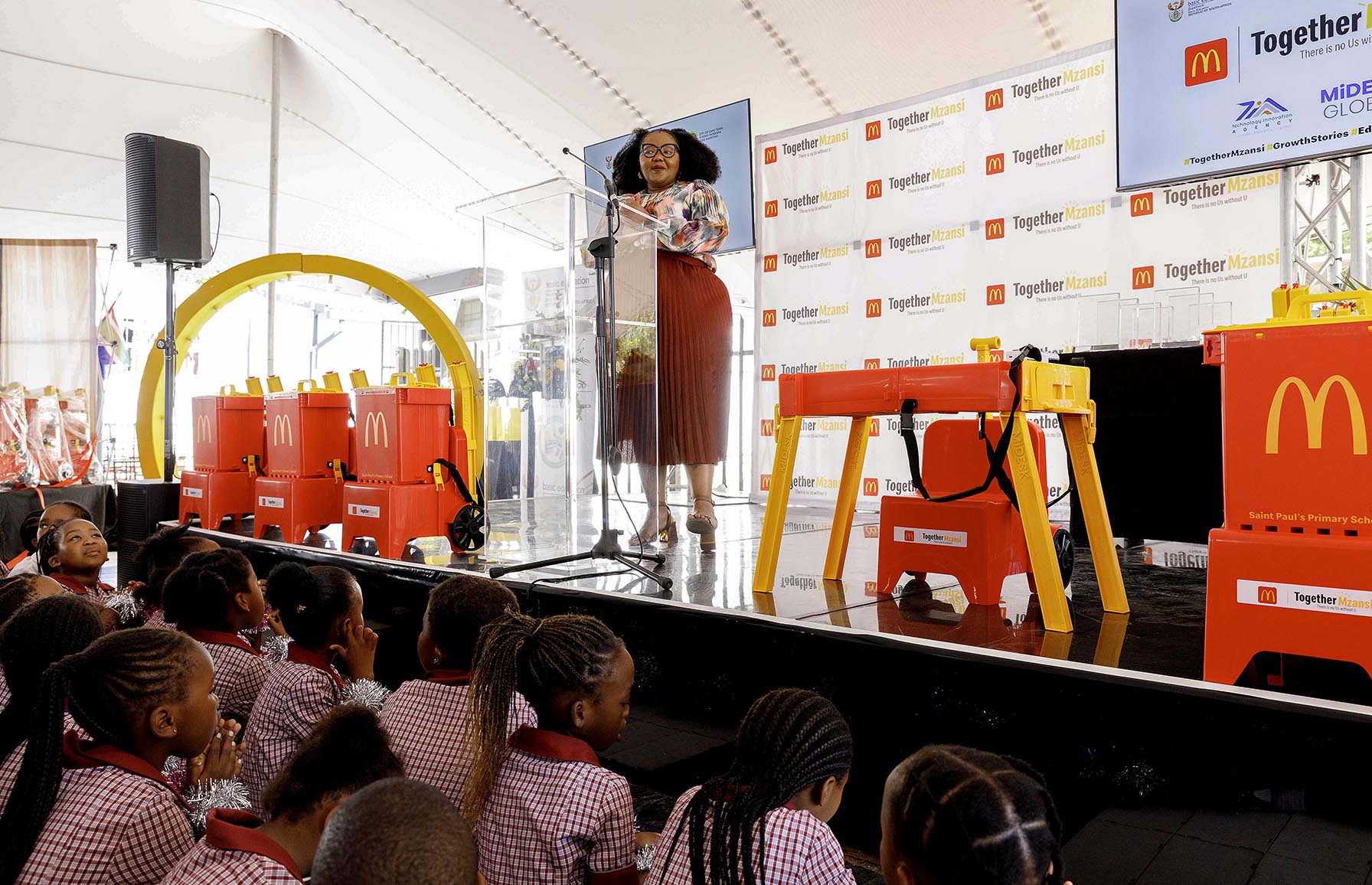In a move to address the ongoing infrastructure challenges in South Africa’s education system, Basic Education Minister Siviwe Gwarube recently welcomed a donation of branded desks to two Cape Town schools. The donation, made by McDonald’s South Africa and MiDesk in partnership with the Department of Basic Education, has sparked both praise and controversy.
The desks, which were handed over to Grade 1 pupils at St Paul’s Primary School in Bo-Kaap on 24 February 2025, are designed to address the country’s severe shortage of classroom furniture. While some view this donation as a creative solution to the education sector’s dire furniture shortage, it has quickly become a subject of intense debate. Critics argue that the desks, emblazoned with the McDonald’s logo, represent nothing more than a corporate branding strategy, using vulnerable schoolchildren as advertising vehicles for fast food. On the other hand, defenders, including Gwarube, argue that such donations are essential to alleviating the chronic shortage of classroom furniture.
Read more: Branded McDonald’s desks for schoolchildren — government failing or a corporation overstepping?
The school desk shortage in South Africa
South Africa is facing a significant shortage of basic educational infrastructure, including desks and chairs. The lack of proper desks has been a persistent issue, particularly in rural and township schools, where students often resort to writing on their laps or using the floor.
In response to a written parliamentary question from the EFF’s Lorato Tito-Duba, the Department of Basic Education revealed alarming figures about the state of school furniture provision in the country. There are 10,669 schools experiencing shortages of furniture. Despite efforts to address this gap, many schools, especially in underprivileged areas, are still struggling to provide basic learning conditions for their students.
The department said that the provisioning of school furniture fell under the responsibility of the provinces, funded through the equitable share allocations. However, it is the department’s role to monitor progress and ensure that provinces meet their targets.
 School desks donated to St Paul's Primary School in Bo-Kaap by McDonalds and MiDesk. (Photo: Gallo Images / ER Lombard)
School desks donated to St Paul's Primary School in Bo-Kaap by McDonalds and MiDesk. (Photo: Gallo Images / ER Lombard)
For the current financial year, provinces aimed to target 5,626 schools for furniture delivery. To date, 742,454 units of furniture have been delivered to 4,490 schools across the country, but there are still significant delays in certain areas. Notably, furniture deliveries were disrupted in the Free State and Mpumalanga due to issues with school furniture contracts. While new contracts have since been secured for the 2024/25 financial year, the delivery process is ongoing.
This shortage is a clear reflection of the deepening challenges facing South African education, exacerbated by financial constraints and a lack of infrastructure investment.
Gwarube’s defence
According to MiDesk’s website, the product is described as a “revolutionary wheelie schoolbag” that converts into a desk and a chair, equipped with a solar light and USB charging portal — features intended to modernise learning for South African children.
Speaking to journalists at the 2025 Basic Education Sector Lekgotla in Gauteng last week, Gwarube highlighted the benefits of the donated desks, emphasising that they had been approved by the United Nations Educational, Scientific and Cultural Organization (Unesco). Weighing just 2kg, the desks were deemed appropriate for use in schools.
She also addressed concerns over the branding of furniture in schools, explaining that it had sparked internal discussions within the department about whether such branding should be allowed in educational settings.
Acknowledging the severe resource constraints within South Africa’s education system, Gwarube noted that about 2.4 million pieces of furniture were still needed in public schools, a shortage primarily caused by financial limitations. DM




 School desks donated to St Paul's Primary School in Bo Kaap by McDonalds and MiDesk on February 24, 2025 in Cape Town South Africa. The handover was made possible through a partnership with McDonalds and MiDesk Global, and give further impetus to the Departments goal of enhancing access, equity and quality in rural schools. (Photo: Gallo Images / ER Lombard)
School desks donated to St Paul's Primary School in Bo Kaap by McDonalds and MiDesk on February 24, 2025 in Cape Town South Africa. The handover was made possible through a partnership with McDonalds and MiDesk Global, and give further impetus to the Departments goal of enhancing access, equity and quality in rural schools. (Photo: Gallo Images / ER Lombard)